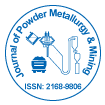Nosso grupo organiza mais de 3.000 Séries de conferências Eventos todos os anos nos EUA, Europa e outros países. Ásia com o apoio de mais 1.000 Sociedades e publica mais de 700 Acesso aberto Periódicos que contém mais de 50.000 personalidades eminentes, cientistas de renome como membros do conselho editorial.
Periódicos de acesso aberto ganhando mais leitores e citações
700 periódicos e 15 milhões de leitores Cada periódico está obtendo mais de 25.000 leitores
Indexado em
- Índice de Fonte CAS (CASSI)
- Índice Copérnico
- Google Scholar
- Abra o portão J
- Genâmica JournalSeek
- RefSeek
- Universidade Hamdard
- EBSCO AZ
- OCLC – WorldCat
- Publons
- Euro Pub
Links Úteis
Diários de acesso aberto
Compartilhe esta página
Abstrato
Investigations of Thermal Damage on the Physical and Mechanical Properties of Gneiss Rock Specimen
MAMBOU NGUEYEP Luc Leroy, NDOP Joseph,NDJAKA Jean-Marie Bienvenu
The effect of thermal damage on the physical and mechanical properties of gneiss has been experimentally investigated. The cylindrical samples prepared from this rock were gradually heated to a specific temperature level of 100, 200, 300, 400, 500, 700, and 900°C and gradually cooled down to room temperature without causing thermal cracking in order to investigate the effect of thermal treatment on physical properties and mechanical properties. The mechanical tests conducted on the sample were the Brazilian test and the uniaxial compressive test. Microscopic analyses from thin section were done to better understand the reasons for the mechanical behavior observed from the mechanical test results. Our study confirms that the thermal treatment reduces the strength of gneiss and increases its porosity. Moreover, it is found that above 600°C of heating, gneiss rock specimens can loss 80% of its original mechanical performances. This is due to a micro crack network connection and their propagation. However between 300 and 400°C we observe an increase in the strength of gneiss. Microscopic examination shows the abundance of feldspar and pyroxene minerals in the gneiss, which in turn show high mineralogical phase changes at 300-400°C compared to change at temperatures above 400°C.
Diários por Assunto
- Agro e Aquicultura
- Alimentação e Nutrição
- Bioquímica
- Ciência da Computação
- Ciência de materiais
- Ciencias ambientais
- Ciências Clínicas
- Ciências Farmacêuticas
- Ciências gerais
- Ciências Médicas
- Ciências Sociais e Políticas
- Ciências veterinarias
- Economia e Contabilidade
- Enfermagem e cuidados de saúde
- Engenharia
- Engenheiro químico
- Física
- Genética e Biologia Molecular
- Geologia e Ciências da Terra
- Gestão de negócios
- Imunologia e Microbiologia
- Informática
- Matemática
- Química
Revistas clínicas e médicas
- Anestesiologia
- Assistência médica
- Biologia molecular
- Cardiologia
- Cirurgia
- Dermatologia
- Diabetes e Endocrinologia
- Doenças infecciosas
- Enfermagem
- Fisioterapia e Reabilitação
- Gastroenterologia
- Genética
- Hematologia
- Imunologia
- Medicamento
- Medicina Reprodutiva
- Microbiologia
- Nefrologia
- Neurologia
- Odontologia
- Oftalmologia
- Oncologia
- Ortopedia
- Pediatria
- Pesquisa Clinica
- Pneumologia
- Psiquiatria
- Toxicologia

 English
English  Spanish
Spanish  Chinese
Chinese  Russian
Russian  German
German  French
French  Japanese
Japanese  Hindi
Hindi